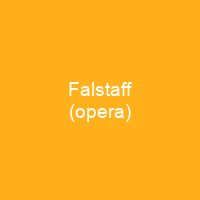Falstaff is a comic opera in three acts by the Italian composer Giuseppe Verdi. The libretto was adapted by Arrigo Boito from Shakespeare’s The Merry Wives of Windsor and scenes from Henry IV, parts 1 and 2. The work premiered on 9 February 1893 at La Scala, Milan.
About Falstaff (opera) in brief

Many composers had set the play to music, with little success, among them Carl Ditters von Dittersdorf, Antonio Salieri, Michael William Balfe and Adolphe Adam. The first version to secure a place in the operatic repertoire was Otto Nicolai’s The merry WIVES of Windsor in 1849, but its success was largely confined to German opera houses. Not only is it Shakespearian, it was based in part on Trecento Italian works – Ser Giovanni Fiorentino, Il Paccio and Baccio’s Decameron. It took the collaborators three years from mid-1889 to complete. Although the prospect of a new opera from Verdi aroused immense interest in Italy and around the world, Falstaff did not prove to be as popular as earlier works in the composer’s canon. Some felt that the piece suffered from a lack of the full-blooded melodies of the best of Verdi’s previous operas. For a comic subject Verdi considered Cervantes’ Don Quixote and plays by Goldoni, Molière and Labiche, but found none of them wholly suitable. He was pleased with Boito’s draftlibretto. He trimmed the plot, halved the number of characters and gave the character of Falstaff more depth by incorporating dozens of passages from the play, which had been piqued by early July 1889, when his interest had been waning.
You want to know more about Falstaff (opera)?
This page is based on the article Falstaff (opera) published in Wikipedia (as of Nov. 05, 2020) and was automatically summarized using artificial intelligence.







